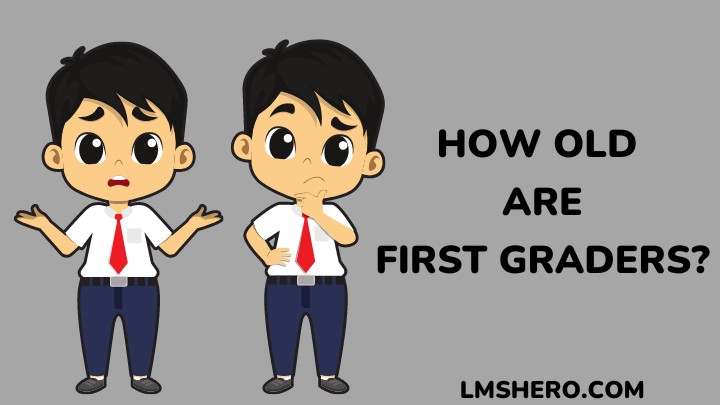Want to know how old first graders are? According to the United States school placement system, first graders are usually 6 – 7 years old.
First grade is a transitional year for kids, they finally make the change from kindergarten into grade school. It marks the beginning of many new experiences, both educationally and socially.
Naturally, they are bound to face some challenges as they transition into this grade. This article talks about first graders, what their curriculum covers, the challenges they may face, and your role as a parent to help them through this stage.
What is the average age of first graders?
The average age of first graders is said to be 7 years. That means that the majority of students in the first grade are between 6 – 8 years old.
Nevertheless, this doesn’t mean students in grade one can’t be younger or older than 7 years. This can happen depending on the country, state, or school district.
First grade curriculum
Generally, a curriculum is designed to address all that a student should learn for each academic section. Each grade curriculum is designed to prepare the kids for the next grade.
The first grade curriculum is designed specifically to challenge students to learn more and build on skills introduced in kindergarten. This curriculum covers the following;
1. Math
During kindergarten, your child learned basic math, like counting with one-to-one correspondence, recognizing numerals, and sorting into groups.
The first grade curriculum explores and introduces the concrete building blocks of math. This includes problem-solving, operations, and number sense.
Your child will also learn to;
- Use a clock (analog clock) to tell time to the minute
- Count objects or money
- Solve simple math word problems or equations
- Recognize shapes and know how many sides each of them has
- Count, read, and write whole numbers that exceed 100
- Count and group objects in 1s (ones) and 10s (tens)
- Identify <, >, and =, and be able to understand what each of them means and solve them appropriately
- Understand basic place value
- Compare the length, weight, and volume of two or more objects
2. Reading
After the end of kindergarten, your child must have learned basic reading habits, like pronouncing, spelling names, reciting poems, reading from letter A to Z, etc.
The first grade curriculum builds further on their reading ability. It builds on their phonemic awareness with more complex sounds like blends and digraphs.
Additionally, your child will improve other aspects of his/her reading, such as;
- Learning comprehension of grade-level materials.
- Reading fluently with these grade-level materials.
- Identifying the meaning of words, their synonyms, and antonyms.
- Understanding and retelling a story’s beginning, middle, and ending.
- Understanding similarities and differences between two texts on the same topic.
3. Writing
During kindergarten, your child learns how to write, but the first grade builds extensively on their writing skills. Ranging from intensive spelling to using writing as a tool for communication.
In detail, your child will learn the following;
- Using upper and lower case letters properly in sentence construction
- Using ending punctuation such as periods and question marks properly in sentences
- Correctly spelling and using high-frequency words, also known as “sight words”
- Improving their use of descriptive words when writing
- Learning how to write narratives with two or more appropriately sequenced events.
4. Social studies
In the first grade, your child will learn a lot about society as we know it to be. They will learn how people make up the neighborhood, how the neighborhood makes up cities, how cities make up states, and how states make up the nation.
Additionally, they would be taught the importance of being part of society, beyond just their families.
5. Science
Just like math, first graders will be taught science, which is simply about understanding patterns that define nature. There are three units of science that would be covered in their curriculum.
- Earth sciences – Which talks about air and weather.
- Life sciences – This talks about plants and animals.
- Physical sciences – This talks about solids and liquids.
6. Visual art
First graders will learn to identify colors, shapes, forms, and textures. They will also learn practical aspects of this subject. This includes; creating secondary colors by mixing primary colors and describing the process.
What are the challenges that first graders face?

Generally, the challenges that first graders face are;
1. Developing a reading habit
As kids, the concept of studying regularly is one that they do not have. They find it difficult to concentrate on their studies, and even when they do, they find it hard to grasp the concept quickly.
2. Learning and writing new words
First graders would be taught to improve their vocabulary, and many find it difficult to learn, understand, pronounce, and write new words. This is an important part of their learning experience and can be quite challenging for them.
3. Expressing their abilities
Another major challenge that first grader face is expressing their abilities or talents in front of their peers.
Showing abilities is important in the growth and development of a child. Not only does it aid development, but it also allows your child to be more sociable with fellow students.
4. Understanding math concepts
Math is naturally a complex subject that requires constant practice to understand. As first graders, kids may find it hard to grasp these new concepts, and math becomes a challenging subject for them.
How to prepare your child for these challenges
First graders are kids, they get anxious, overwhelmed, and stressed by school activities or assignments. As a parent, you can help your child in various ways in order to make their experience less challenging and for them to earn good grades.
Your role as a parent includes the following;
- Enlightening them on the importance of education.
- Encouraging and motivating them to study more.
- Encouraging your child to socialize more.
- Helping your child develop his or her writing skills.
- Assisting them with math.
- Getting them a tutor to help them study.
- Encouraging them to showcase their talent.
- Making sure your child gets plenty of rest and eats a healthy diet.
FAQs
Can a 5 year old start first grade?
Yes, they can.
Although the age range is between 6 – 7, certain school districts are willing to accept 5 year old if they are up to the task.
What skills should a first grader have?
A first grade should have fine motor skills, cognitive skills, communication skills, and social skills.
What grade is a 9 year old?
According to the US grade placement, a 9 year is supposed to be in the 4th grade.
What are the best apps for first graders to learn math?
Your child can learn math on any of the following apps; Monster Math (iOS and Android), Splash Learn (iOS and Android), and Marble Math Junior (iOS and Android).
Conclusion: How old are first graders?
First grade is an important starting point in grade school education. The age range for first graders is said to be between 6 – 7 years old.
In this grade, your child will begin to learn subjects and skills that will prepare him/her for college. Surely, there are challenges that come at this stage, mostly because they are new to this system of education.
As a parent, it is your duty to ensure that this experience is less challenging and also help them come out with good grades.
For you to accomplish this, you must ensure you assist them in their studies and encourage them to be more dedicated. By doing this, you will help them grow into responsible and successful adults.
I hope you enjoyed reading this article, if you did, you should also see how old second graders are and the skills they need.
Thanks for reading.






